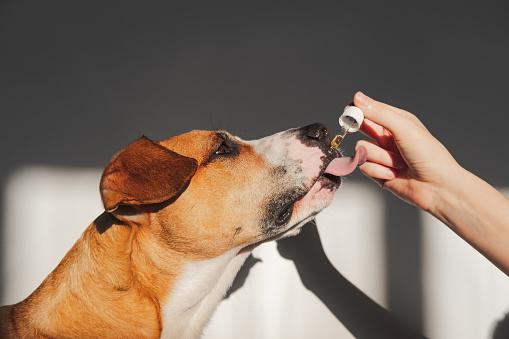
CBD for dogs can benefit dogs with a variety of problems, including pain and anxiety, but you must choose a canine CBD product from a trustworthy supplier.
Cannabidiol (CBD), a cannabis plant derivative that has no psychotropic ingredients, is now widely available in pet supplements.
According to “Pet Supplements in the U.S.,” 21% of dog owners bought CBD dietary supplements in 2020. According to Packaged Facts, sales of CBD for dogs products are expected to reach $95 million in 2020, a 217% rise from the previous year. Additionally, all of the nation’s top chains of pet supply stores have established retail ties with the producers of CBD dietary supplements.

You can see that there are many different CBD for dog products available. How do you decide?
Products made from hemp but without CBD may have health benefits, but if you want your dog to specifically benefit from CBD for dogs, you must choose a CBD-containing product!
Verify the dates! Reputable manufacturers provide the lab results for their items on their websites or have QR codes that link to online reports. The report must include the date, a detailed description of the tested item, as well as the name, contact information, and phone number of the test provider.
To ensure that you can administer dosages consistently for a predictable impact, the lab report should list the cannabinoids that are present in the product and their concentrations.
Avoid a firm’s items if the product label or company material implies that it is a panacea for all of your dog’s ailments. Avoid “treats” as well, which are considered foods and are therefore prohibited from having CBD. “CBD dog treats for anxiety” is one example. Laws governing labeling violations are a sign of a novice or dishonest product maker. Avoid the business in either case.
The findings of a research that examined goods that contained hemp or cannabidiol compounds were released by the U.S. Food & Drug Administration (FDA) in 2021. Tests were performed on nearly 150 goods to identify the cannabinoids that were present in them. Less than half of the surveyed items had cannabidiol concentrations that were 20% or less of what was stated on the label.
Such outcomes are intended to be avoided by using certification from the NASC and third-party lab testing.
First-time users will benefit from advice on dosage and what kind of product will work best for their dogs. Since veterinarians aren’t allowed to discuss CBD for dogs with their patients in most states, let alone recommend a specific product, the next-best resource is an experienced user who has a close, long-term retail relationship with ethical product suppliers.
An increasing number of dog owners who support CBD for dogs do so because they feel it treats cancer and immune-mediated disorders while reducing anxiety, seizures, discomfort, and allergies. Manufacturers of CBD supplements, however, who are subject to regulation under the Dietary Supplement Health and Education Act of 1994 (DSHEA), are not permitted to make “drug” claims about how CBD treats or alleviates any illness or medical symptom.
Because there were considerable legal obstacles for both academic and commercial study into CBD, as well as restrictions for growing and harvesting these plants, then refining and marketing products that include CBD for dogs, up until recently, CBD’s appeal has been largely driven by anecdotal evidence. When the Agriculture Improvement Act, also known as the Farm Bill, was passed in 2018, it descheduled cannabis species with less than 0.3% dry weight of delta-9 tetrahydrocannabinol (THC), removing these obstacles and opening the door to both commercial production of CBD-containing goods and research into its safety and advantages.
Studies have so far shown promise. Researchers from Cornell University conducted a 2018 study on dogs with osteoarthritis that revealed no adverse effects, a considerable reduction in pain, and an increase in activity. A tiny Colorado State University study (16 dogs) examined the use of CBD for dogs to treat canine idiopathic seizures and discovered that canines receiving CBD experienced an 89% decrease in seizure frequency.
Without plenty of anecdotal evidence that at least some of the products are beneficial to dogs, it is difficult to see how the CBD for dogs market could have expanded so quickly. In any young, rapidly expanding market, there are plenty of con artists, but few individuals keep buying useless products over and over again. The industry’s amazing rise indicates that they are effective, and the startling paucity of tales of negative experiences should persuade you to try CBD for your dog.
If you would like more information onthe CBD for dogs you can contact us through our contact page or check out our Facebook Page.